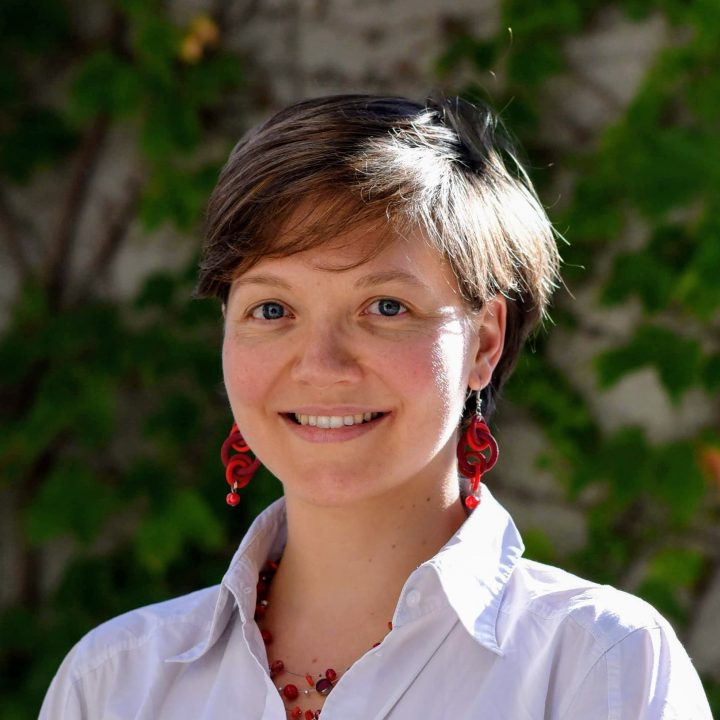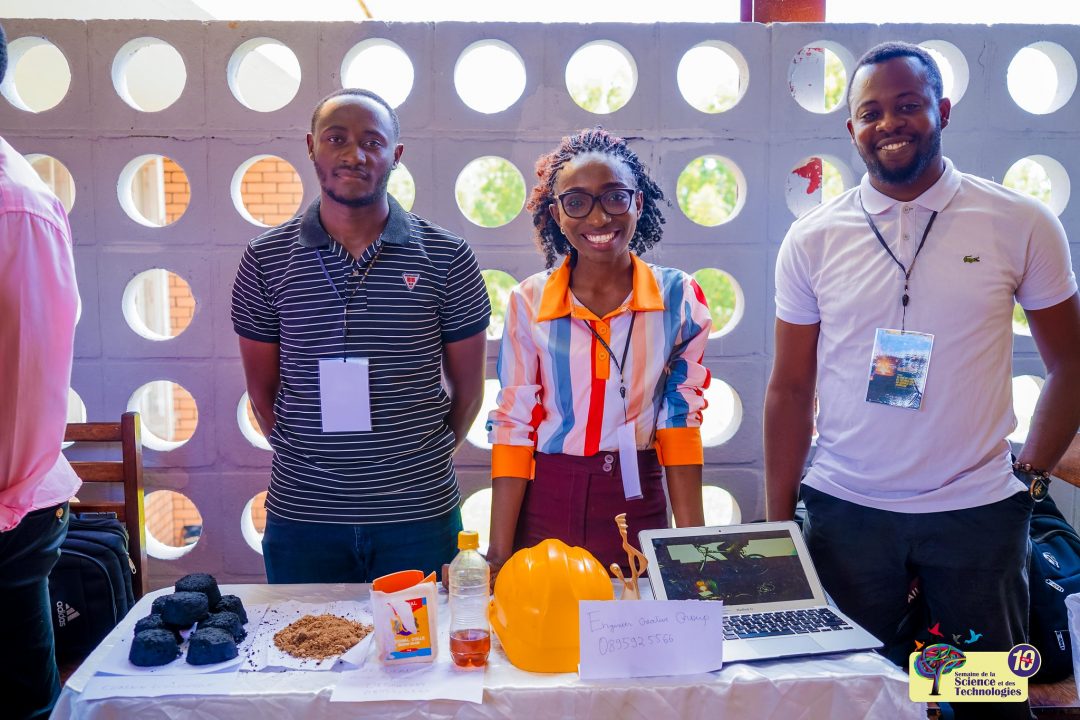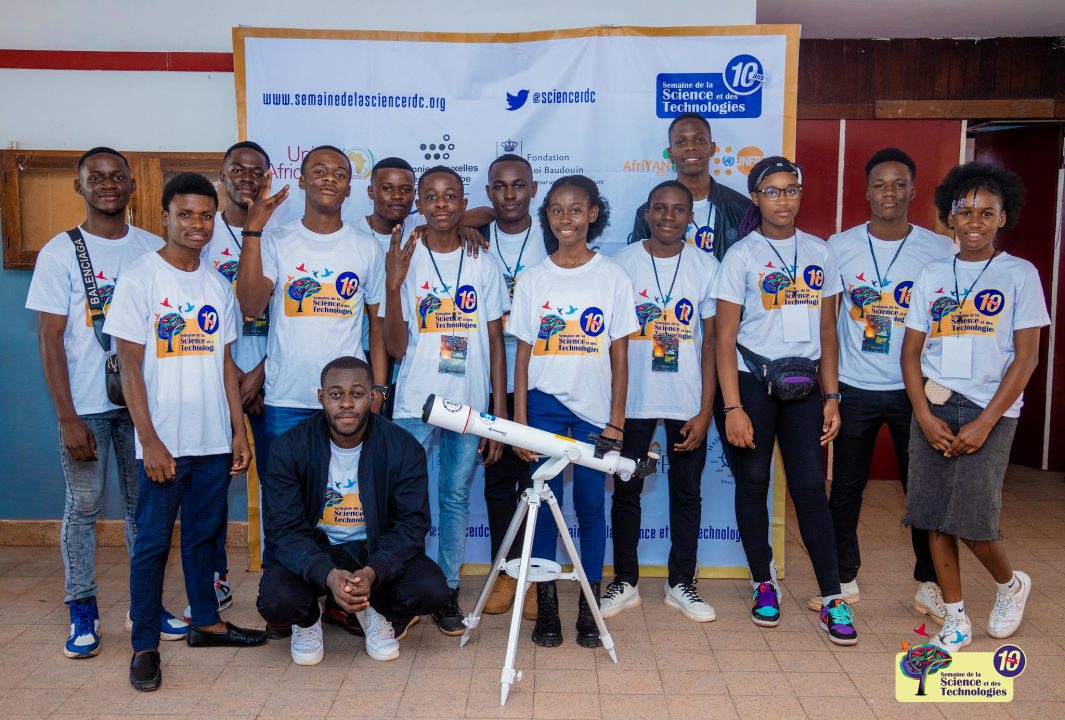News & Events
August 4, 2023
Dr. Claire David, McDonald Institute Ambassador 2022-23


Dr. Claire David, the first McDonald Institute Ambassador, has recently completed her six-month journey through eight African countries. She’s been collaborating with research colleagues and teaching one hundred graduate students the mathematics behind machine learning while also presenting the ATLAS and DUNE collaborations she works on to thousands of university and high school students. Her recent work has taken her to university campuses in South Africa, Senegal, Benin, Togo, Democratic Republic of the Congo, Cameroon, Rwanda and Ghana.
She’ll be returning in the fall to take up a new full-time position in Cape Town leading the development and delivery of post-graduate machine learning training at the African Institute of Mathematical Sciences (AIMS). This pan-African network of excellence is, “enabling Africa’s talented students to become innovators driving the continent’s scientific, educational and economic self-sufficiency”. Its motto is: “We believe the next Einstein will be African.”
“I understand more and more, after my experience at AIMS, the incredible potential of Africa,” says Dr. David. “On such a vast and diverse continent with a very young population, there are definitely many undetected geniuses who are not given the proper conditions to excel. Propelling Africa’s scientists into the international community is a win-win for everyone: it renders justice to those facing too many obstacles – and to the globalized scene of scientists, so high-paced, quite ‘formatted’ – it would benefit from different approaches African minds can offer.”
“there are definitely many undetected geniuses who are not given the proper conditions to excel. Propelling Africa’s scientists into the international community is a win-win for everyone…”
Dr. David’s first encounter with AIMS was in 2019 when, as a postdoctoral researcher, she went to the AIMS Ghana centre to co-lecture for three weeks on stochastic modelling. Two years later, as an assistant professor working on both collider physics with the ATLAS experiment and neutrino physics with DUNE, the South African centre contacted her to teach again for AIMS. She first approached the McDonald Institute in Fall of 2022 to see how it might participate in expanding her engagements with AIMS national chapters and the biennial African School of Physics, which happened to be in late 2022 in South Africa. The Institute responded by building a pilot program to provide arm’s length support of expenses incurred by community members promoting Canadian astroparticle physics abroad over an extended period of time, especially within research and training ecosystems where our community’s research and training networks are less robust.

“Having used CFREF’s incredible financial support to catalyze the growth of the Canadian astroparticle community to a critical mass of academic researchers, the Institute needs to turn its attention to promoting the scope and breadth of opportunities for international researchers to pursue work in Canada, or with researchers working in Canada,” says Associate Director Edward Thomas.
“To force a hockey metaphor on our thinking, the community’s historically done lots of ‘work along the boards’ in the U.S., EU, Japan, Korea and China ‘where the puck lies.’ What we want to also think about is the expanding research ecosystems in Africa, South America, India and Australia ‘where the puck is going to be’ over the coming decades as new facilities and experiments are commissioned and new clusters of research excellence emerge.”
Stationed at AIMS South Africa for a four-month special contract as lecturer, tutor and coordinator, David’s other first major engagement as an MI ambassador occurred at the African School of Physics, hosted by Nelson Mandela University in Gqebera. She gave an introduction to Machine Learning, attended by both students and several professors. She also made important connections that led to invitations to teach or give talks in other African countries.
During her visits to Johannesburg, Benin, Togo, and Ghana, she gave presentations on the ATLAS and DUNE projects, along with a shorter version of her course “Learn The Math Behind Neural Networks”. Her engagements were not limited to academia; she also worked to develop collaborative partnerships, such as helping Togo become involved in the LHC program for High Energy Physics, and working with the McDonald Institute on several promising technology partnership conversations with physics researchers. Within the six months of her presence on the continent, she visited the five AIMS centres – South Africa, Senegal, Ghana, Cameroon and Rwanda – delivering her course in the three formers and giving seminars and/or panel discussion in all of them.

In the Democratic Republic of the Congo she contributed as instructor and keynote speaker of a two-week-long annual Science and Technology week in several towns of the country that attracted 7,000 attendees, primarily students. She gave several colloquia at University Kinshasa, then was attached to the physics pavilion, teaching a particle physics module to 50 high school students. During the two-day event, Village of Sciences, some of these trained led a booth about particle physics. Next door, Dr. David gave an introduction to her research in experimental particle physics to a constant flow of visiting classrooms from nearby schools. In total, more than 5,000 pupils learned about CERN and the questions physicists and astrophysicists seek to answer.
“There is an incredible enthusiasm among students, schoolchildren, and highly passionate students already asking very relevant questions,” she said in a Semaine de la Science video interview about the launching event in Mbanza-Ngungu, a town in the Congo-Central province, 140 km south of Kinshasa.
“There is an overflowing interest in science and engineering, and it’s such a reassuring hope to see the youth’s interest in STEM. I will say what I have always said, to follow one’s interests. I followed my interests, and I have a privileged position, that’s for sure, but I think it’s entirely logical wherever we are, to push and pursue what we love doing because if we love doing something, we naturally become good at it, and then we have a kind of aura where we inspire others and connect with other people, and others will help us.”
In all these travels, Claire David is keen to foster scientific knowledge and collaboration, building bridges between the African scientific community and the broader international physics and AI communities. She will have an excellent opportunity to build on the last six months’ activity in her new role of Program & Research Manager of the new master course AI For Science (financed by DeepMind) and Resident Researcher in Machine Learning, an exciting early career transition from her role as an assistant professor at York University.
“I am given the golden opportunity to manage a master in AI where I will coordinate, teach and also learn a lot at the same time,” said Dr. David.
“ I will be honest with the students: there are aspects of AI I do not know yet, and I will learn with them. Ideally, we will have a conversation.
“We will build a community directly connected with the international scene but focusing on Africa’s future endeavours in both fundamental and applied science. Even more, AIMS and I are so excited to shape AI scientists who are very conscious of the uses and abuses of algorithmic tools and share different visions with a continent that has such a vast potential.”

The McDonald Institute thanks Dr. David for her excellent work in introducing Canadian astroparticle physics research to her students and colleagues through the context of her teaching and research.
“We’re still working with scientists and students that Dr. David connected us with,” said Mr. Thomas. “And we’re very excited she will return to AIMS and remain a key network partner for us in the years to come.”
“We believe the next Einstein will be African.”

